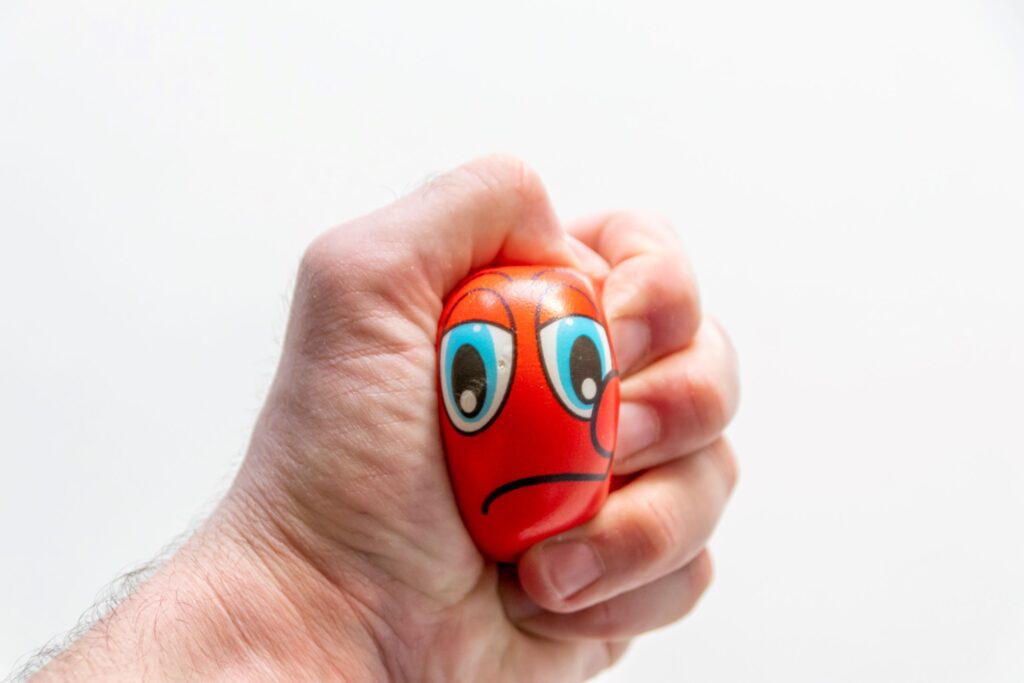April is Stress Awareness Month in the UK—a time to pause and reflect on how stress is showing up in our lives, and what it’s costing us.
In a culture that often glorifies being busy and always switched on, it’s easy to ignore the signs until stress starts to take its toll. This month is an invitation to check in with ourselves, to ask not just how we’re coping, but how we’re really doing.
Below, we explore what it means to live with stress—not by pushing it away, but by finding healthier ways to carry it.
What is Stress?
Stress is a fact of life. It shows up in our inboxes, our calendars, our relationships, and our late-night thoughts when we should be sleeping. It’s the pressure to keep up, to be enough, to handle everything that gets thrown our way.

Sometimes, stress gives us energy, pushing us forward. But when it builds too high, it stops being fuel and starts feeling like weight—like something we’re carrying all the time, even when we don’t realise it.
We tell ourselves, Once I get through this, things will calm down. But life has a habit of replacing one stress with another. There’s always another deadline, another responsibility, another thing to worry about. And so, we wait—for a break that never really comes.
But what if the goal isn’t to eliminate stress? What if it’s about learning to live with it, without letting it take over?
When Stress Stops Being Helpful
Not all stress is bad. A little bit of it keeps us moving, it helps us meet challenges, focus on what matters, to get things done. But too much for too long? That’s when it turns against us.
When stress is no longer a passing wave but a constant undercurrent, it starts showing up in ways we might not expect:
- Feeling constantly exhausted, even after sleeping.
- Snapping at people over small things that normally wouldn’t bother you.
- Overthinking everything, from big decisions to what to text someone back.
- Forgetting things, zoning out, struggling to concentrate.
- A never-ending to-do list, no matter how much you finish, there’s always more.
- Restlessness, even when you finally have time to relax, you can’t seem to settle.
It sneaks into your body too—tight shoulders, tension headaches, a stomach that’s in knots. You might not even realise how much stress has been sitting in you until something forces you to stop.
And that’s the real danger of long-term stress—it becomes normal. We adapt. We get used to feeling overwhelmed, tired, wired. But just because we can function under stress doesn’t mean we’re okay.
What Is Your Stress Trying to Tell You?
Stress isn’t just a feeling—it’s a message. It’s your mind and body trying to get your attention, to tell you that something needs to change.
Maybe it’s telling you…
- You need more rest than you’re giving yourself.
- You’re carrying things that aren’t yours to carry.
- You’ve been saying yes to too much, and it’s time to start saying no.
- You’re running on autopilot, going through the motions instead of living.
We often ignore these messages because slowing down feels like a luxury, like something we’ll do later when things calm down. But stress doesn’t disappear on its own. If we don’t listen to it, it just finds other ways to make itself known.
How to Live with Stress Without Letting it Own You
You don’t have to remove stress entirely to feel better. You just have to stop letting it control the way you live.

1. Break the Cycle of Overwhelm
When everything feels like too much, pause. Ask yourself:
- What’s actually urgent, and what just feels urgent?
- What can I let go of?
- If I could only do one thing today, what would it be?
Most of us carry invisible pressure to do everything all at once. But stress thrives on that pressure. Slowing down—even just mentally—helps break the cycle.
2. Give Stress an Exit Route
Stress doesn’t just live in your mind—it sits in your body. If you don’t let it out, it builds up. Try:
- Moving – walking, stretching, anything that shakes off the tension.
- Taking deep, intentional breaths (not just the automatic ones).
- Loosening your jaw, dropping your shoulders—tiny ways to tell your body, You’re safe. You can let go.
3. Find Rest That Actually Feels Restful
Scrolling, binge-watching, zoning out—it feels like rest, but does it make you feel better?
- Rest isn’t just about doing nothing. It’s about doing things that refill you.
- What relaxes you? What makes you feel lighter afterward? More of that.
4. Let Go of What You Can’t Control
Some stress comes from things we can change—like taking on too much or not setting boundaries. But some things are out of our hands.
If stress is coming from something you can’t fix—uncertainty, other people’s actions, the state of the world—try shifting focus:
- What can you control, even if it’s small?
- Where can you create moments of peace, even in chaos?
Letting go of things you can’t control isn’t about giving up—it’s about choosing where to put your energy.
5. Ask for Help When You Need It
You don’t have to carry everything alone. Sometimes, just saying I’m struggling to the right person can take some of the weight off.
Help doesn’t always mean fixing things. Sometimes, it’s just having someone sit with you in the mess, reminding you that you’re not in it alone.
Stress will always be part of life—there’s no avoiding it completely. But that doesn’t mean it has to run the show. Instead of fighting against it, you can learn to navigate it differently. You can notice when it’s building, acknowledge what it’s trying to tell you, and decide how much space it deserves. You don’t have to let it take over, and you don’t have to let it define you.
If you need help coping with stress or tackling the issues underlying it counselling could help. Whether it is work-related stress or tied up in family relationships or life challenges, counselling can help you learn how to cope with the stress in your life.
To find out more about counselling with The Spark or book a counselling appointment contact us.
References:
- Akpan, N. (2020). Stress-Proof: The Scientific Solution to Protect Your Brain and Body—and Be More Resilient Every Day. HarperOne.
- Bessel van der Kolk, M. (2014). The Body Keeps the Score: Brain, Mind, and Body in the Healing of Trauma. Penguin Books.
- Brown, B. (2021). Atlas of the Heart: Mapping Meaningful Connection and the Language of Human Experience. Random House.
- Hanson, R. (2018). Resilient: How to Grow an Unshakable Core of Calm, Strength, and Happiness. Harmony.
- Kabat-Zinn, J. (2018). The Healing Power of Mindfulness: A New Way of Being. Hachette Books.
- McGonigal, K. (2020). The Joy of Movement: How Exercise Helps Us Find Happiness, Hope, Connection, and Courage. Avery.
- Porges, S. (2021). The Pocket Guide to the Polyvagal Theory: The Transformative Power of Feeling Safe. W.W. Norton & Company.
- Seppälä, E. (2016). The Happiness Track: How to Apply the Science of Happiness to Accelerate Your Success. HarperOne.
- Shapiro, S. & White, J. (2023). Good Morning, I Love You: Mindfulness & Self-Compassion Practices to Rewire Your Brain for Calm, Clarity & Joy. Sounds True.
- Siegel, D. J. (2020). The Power of Showing Up: How Parental Presence Shapes Who Our Kids Become and How Their Brains Get Wired. Ballantine Books.
- Williams, M., & Penman, D. (2023). Mindfulness: A Practical Guide to Finding Peace in a Frantic World (Updated Edition). Piatkus.
- Worthington, E. L. (2023). Forgiveness and Reconciliation: Theory and Application. Routledge.

